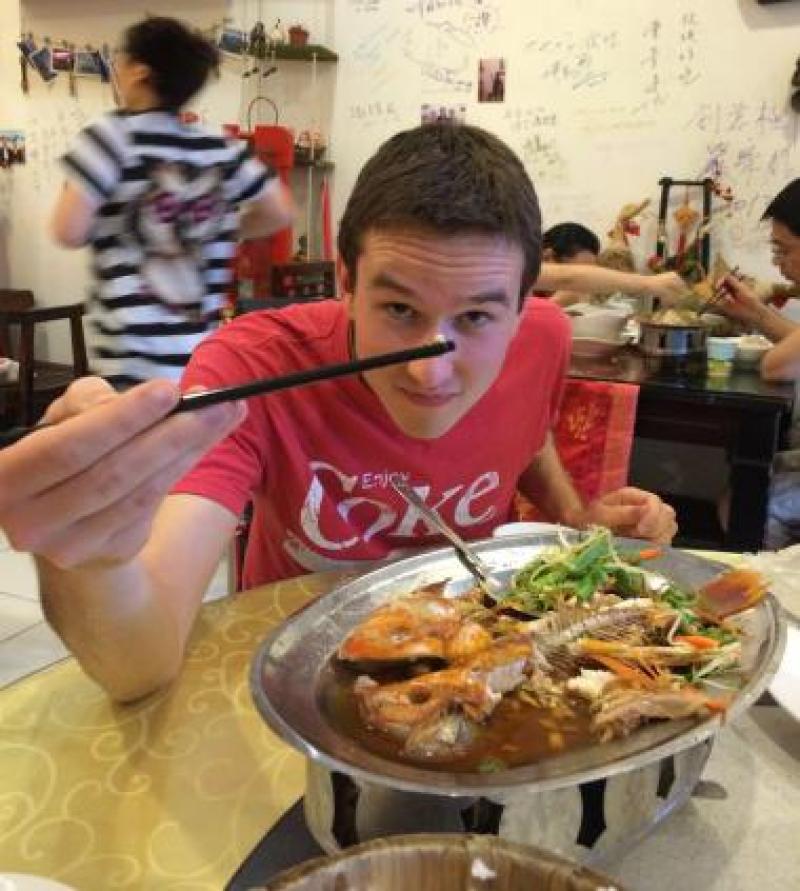Third-year Russell Bogue Spends Summer Exploring Taiwan-Mainland Relations


Russell Bogue is a third-year student from Guilford, Connecticut. A Jefferson Scholar and Echols Scholar, he is an honors politics major and studies Mandarin Chinese. This summer he used a $3,000 Harrison Undergraduate Research Award to travel to Taipei, Taiwan to survey college students’ political views. The following are his reflections on the experience.
Earlier this year, something remarkable happened in Taiwan: university students occupied government offices for close to a month, effectively preventing representatives from going to work and forcing concessions from lawmakers before normal operations could resume. The spark? Taiwan was close to passing a trade agreement with China that would deepen economic ties between the mainland and its island neighbor.
The protestors – overwhelmingly between 18 and 22 years of age – feared that the passage of the trade pact without line-by-line review would cede too much influence to China. They demanded greater transparency from their government. Many claimed that China would use economic integration to compel political integration.
Eventually, this so-called “Sunflower Movement” earned a major concession from President Ma Ying-jeou and the ruling Kuomintang: The trade pact was suspended pending further review, and the government pledged to subject similar agreements to more exacting scrutiny.
The political relationship between the People’s Republic of China, or PRC, and the Republic of China (ROC, or Taiwan) is fascinating and perhaps without precedent in the modern era. When I set out to design a research project last September, all I knew was that I wanted to study something related to Taiwan and its complex relationship with its larger and more powerful neighbor. Over the course of several months, I narrowed in on a topic: the political opinions of Taiwanese youth. I wanted to know how they viewed the question of reunification with the mainland. What did they fear about potentially joining the PRC? How did they frame the question, and what precedents did they use? Did they view themselves as Taiwanese or Chinese?
Why does this matter? For years, the U.S. has supplied Taiwan with military arms, despite vehement protests from China (and the attendant political costs for the relationship between the world’s two largest economies). Taiwan relies heavily on U.S. power in East Asia for protection from the PRC, which is explicitly intent on assuming Taiwan as a Chinese province. Understanding the political situation in Taiwan is therefore critical to making informed choices about what role the U.S. should play as mediator or arbitrator. More, the right of the Taiwanese to determine their own future and retain a democratic government is potentially at stake.
Insofar as both of these issues will depend on the choices that current university students make in the coming decades, gauging the political temper of Taiwanese youth is a pertinent question for any student or researcher interested in the region.
With a just a few months to go before my departure to National Chengchi University in Taipei, Taiwan, the Sunflower Movement burst onto the scene. The timing couldn’t have been better. When I arrived in mid-May, just a month had passed since the protests had disbanded – a month of reflection, a month to rationally assess what the protests were about and why they mattered.
With the help of Professor Tse-Kang Leng and political science student Wei-Rong Chou, I spent just over two weeks interviewing 23 Taiwanese students and two Chinese students in English on a range of topics: how they viewed reunification with China (my original research topic), whether Taiwanese students believed they had a political voice in Taiwan, how the students felt they differed from their parents and older generations, and how they viewed the Sunflower Movement.
The research presented novel challenges for me. The first, and most intimidating, was arriving alone in a foreign country with only a vague idea of my schedule and how I would find students willing to sit down to a lengthy interview on controversial political topics. I landed in Taipei armed with an outline of questions, a recording device, my computer and some background research – but does that really count as preparation? It’s hard not to struggle with feelings of self-doubt when you’re staying in guest housing reserved for visiting professors, yet you’ve just completed your second year at university. Why would anyone take me seriously?
But the hard work of Wei-Rong and Leng made the process far smoother and more successful than I thought possible. As it all began to fall into place, I felt capable of tackling other challenges: learning from a post-doctoral researcher at National Chengchi University how to use statistical software to compare the responses of Taiwanese youth to other demographics on a number of important political questions, which buttressed my personal interviews with broadly representative statistical data; exploring Taipei by myself; eating most meals alone; struggling with feelings of FOMO – the fear of missing out – when you’re in Taipei and most of your friends are at Beach Week; and many more. As my stay in Taiwan lengthened, learning how to deal with these unforeseen challenges became as important as the research itself.
In the end, traveling to Taiwan gave me a lot more than just a greater understanding of and appreciation for the political problems facing Taiwan. My biggest takeaway was that I – and, by extension, most any other undergraduate student – can actually do something as ridiculous as jet off to a foreign country to conduct political survey research, no matter how underprepared or under-qualified I feel. The trick to pulling it off wasn’t believing in myself. It was being stubborn enough to try to prove myself wrong when I doubted that I could do it. It was being OK with uncertainty. It was learning how to be humble enough to ask for help.
Well, I guess I’m still working on those last two. But I’ve got the stubbornness down.




